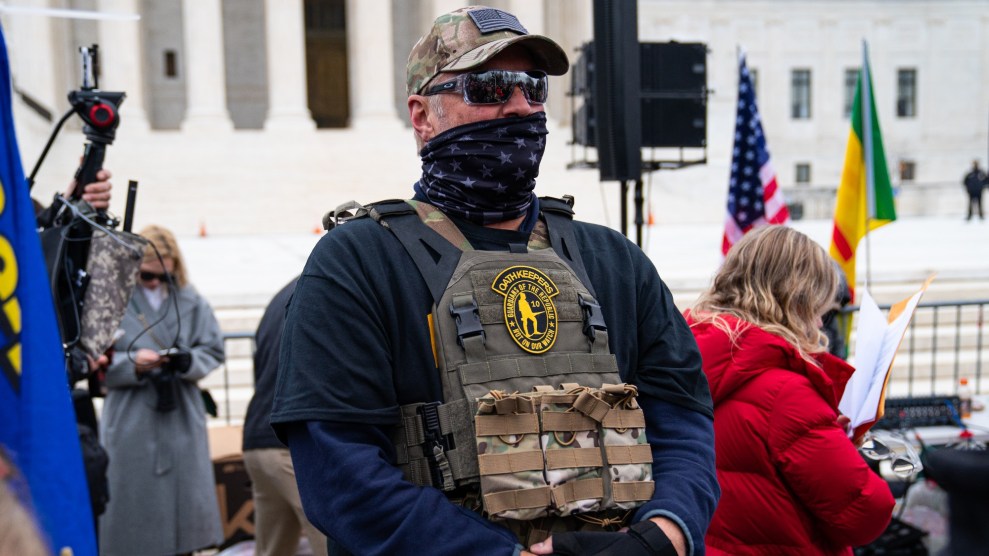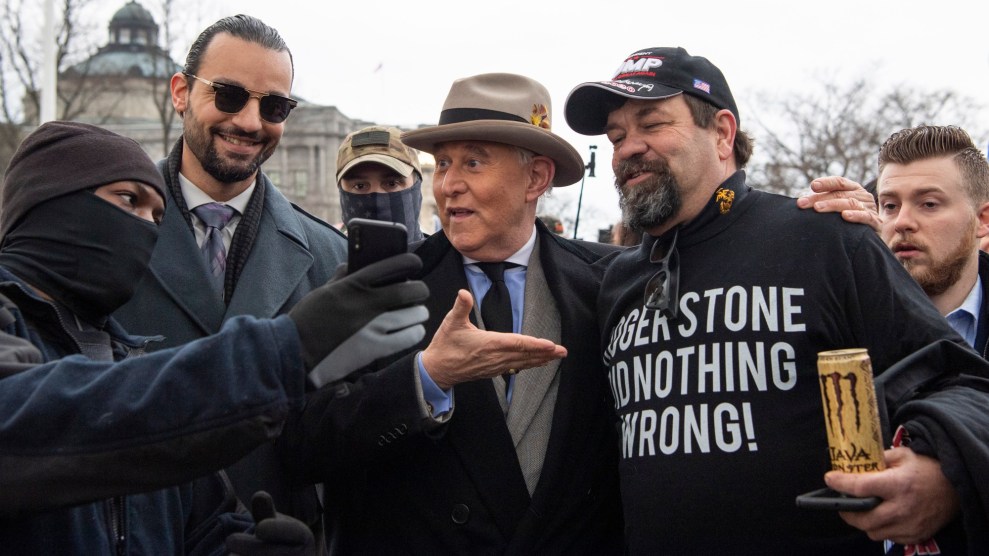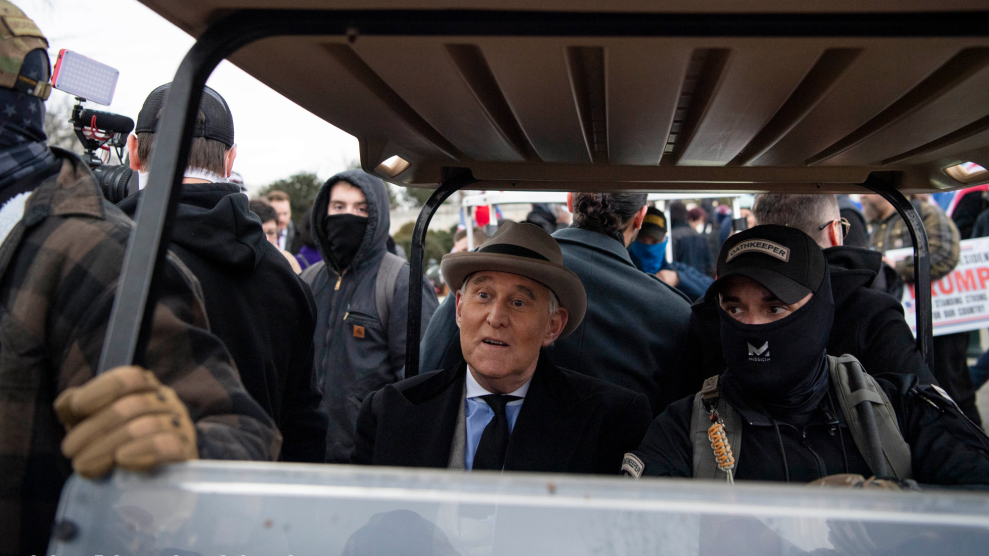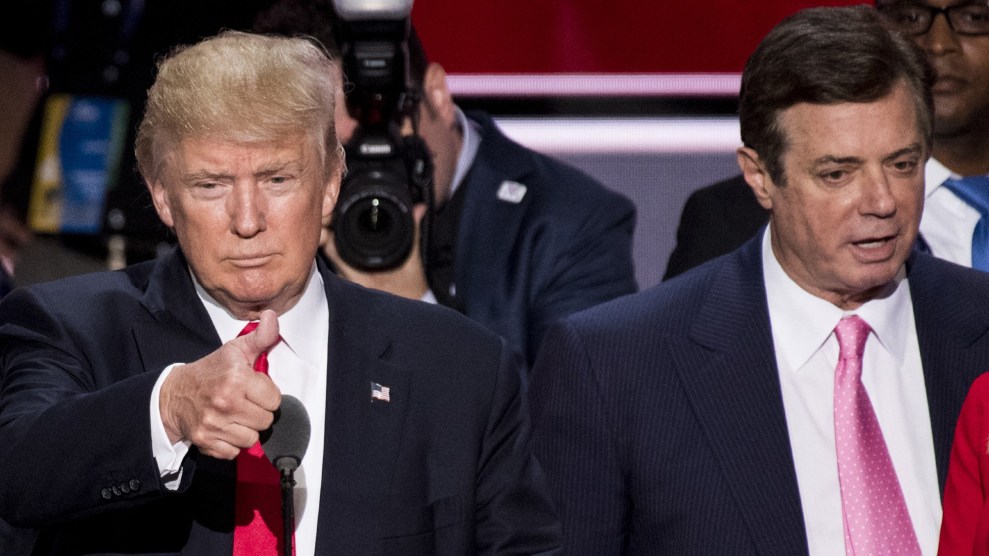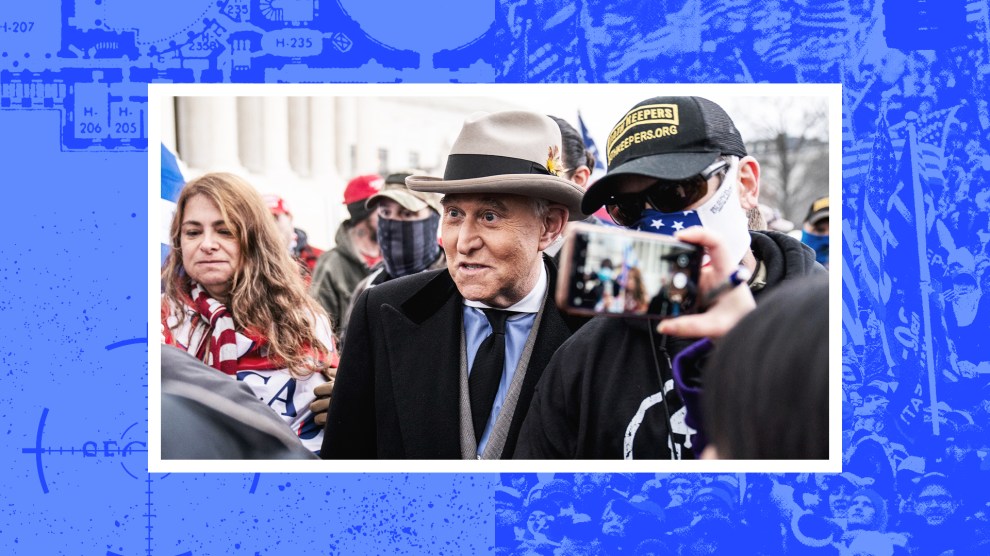
Mother Jones illustration; Ken Cedeno/Sipa USA/AP
The night before the January 6 attack on Congress, Roger Stone danced on a stage in Washington’s Freedom Plaza to a rap song featuring his own money-raising slogan: “Roger Stone did nothing wrong.” Minutes later, the longtime Trump adviser—clad in a pinstriped suit and tan fedora—declared that the “fight” to keep the defeated president in power represented “an epic struggle for the future of this country between dark and light, between the godly and godless, between good and evil.”
“I will be with you tomorrow, shoulder to shoulder,” he told an estimated 2,000 supporters of Donald Trump.
In fact, as Trump fans stormed the Capitol the next day, Stone was in a downtown DC hotel, from which he hightailed it back to his Florida home. Ever since, Stone has pointed to his absence from the protests that day as evidence that he had no role in, or advance knowledge of, the insurrection.
This is sort of Stone’s schtick. Beginning with his glancing involvement in the Watergate scandal as a 19-year old, he has publicly promoted himself as a plugged-in operator, a self-proclaimed “agent provocateur” involved in a long list of controversial GOP machinations—even as he has scrambled to avoid legal consequences. He seeks notoriety but also deniability. He courted attention in 2016, when he told the public and the Trump campaign that he’d had a hand in WikiLeaks’ release of Democratic emails hacked by Russian agents. When the investigation started, Stone claimed he’d overhyped his role. Convicted of lying extensively to Congress and witness tampering, Stone dodged prison when Trump commuted his sentence. Then, while Stone was promoting the Big Lie, Trump pardoned him. After January 6, Stone reportedly asked a Trump lawyer to help him secure another, preemptive pardon in case he was charged in connection with his efforts to overturn the election.
Stone has danced on the edges of the January 6 scandal for nearly two years. But he may now be getting the kind of attention he dislikes. Two separate investigations appear be homing in on him. On Thursday, the congressional committee investigating the attack will hold a hearing that will reportedly feature footage and other material detailing Stone’s links to the Proud Boys and Oath Keepers, two far-right groups accused of plotting to attack the Capitol.
Stone has also come up repeatedly in the ongoing seditious conspiracy trial of five Oath Keepers, including the group’s founder, Stewart Rhodes. A chat called “Friends of Stone” on the encrypted app Signal—which included Stone and 46 or so of his allies—has become a key source of evidence for prosecutors seeking to show that Rhodes was planning violence as soon as Trump lost. “The final defense is us and our rifles,” Rhodes told the group, after news outlets called the election for Joe Biden. “Trump has a duty to stand, but so far, her [sic] hasn’t. As Roger Stone said.” It’s not clear what statement of Stone’s Rhodes might have been referencing.
Stone has not been charged with a crime related to January 6 or the 2020 election. Nor is there clear evidence that he played a role in planning the attack or coordinating Trump’s broader effort to retain power. Stone denies wrongdoing. “Any claim, assertion, implication, or accusation that I knew in advance about, participated in, or condoned any illegal activity on January 6 at the Capitol is categorically false,” he said in a statement sent by his lawyer. “Nor did I play any role whatsoever in the efforts to delay the certification of the electoral college.”
But Stone had a striking number of links to people charged with taking part in the attack on Congress, along with ties to Trump and others who helped chart Trump’s legal and political maneuvers. He was a nexus. Stone appears to have acted, at least, as an early adopter of outlandish election fraud lies and as a connector and cheerleader for extremists interested in helping Trump hold on to power.
Here is a partial rundown of Stone’s activities surrounding the election:
1. “Stop the Steal”
Years before Joe Biden became the Democratic nominee, Stone coined the name of the movement that would falsely claim Trump won in 2020. In 2016, Stone launched a nonprofit called “Stop the Steal” to raise money to prevent the Republican Party from denying Trump the GOP presidential nomination at its convention. In 2020, Ali Alexander, working with Stone, adopted that name for his effort to overturn Biden’s victory. A Stone associate set up new group called the Committee to Stop the Steal, and Stone relaunched a previously dormant Stop the Steal webpage, which was updated to argue Biden had not legitimately won.
2. An early call for martial law
During a September 10, 2020, call to a show hosted by conspiracy theorist Alex Jones, Stone said that Trump could only lose through election fraud. Stone suggested Trump declare “martial law” or invoke the Insurrection Act to stop it. In the ensuing months, the Insurrection Act became a preoccupation for many right wingers who argued Trump could use it to take emergency measures to expose imaginary fraud and cling to power. In their ongoing trial, Rhodes and other Oath Keepers have pointed to the law to justify acts that prosecutors say constituted a seditious conspiracy. The defendants say their actions—such as assembling arsenals of weapons near DC—were legal because they were anticipating Trump invoking the Insurrection Act and calling them into action.
3. “The key thing to do is to claim victory”
In an indication of how much he relishes attention, Stone granted extensive access to a Danish documentary crew, even as he was discussing how Trump could remain in power if he lost. The filmmaker provided footage to the January 6 Committee, including video from November 1, 2020, in which Stone, speaking to Trump fans, seemed to anticipate Trump’s plan to prematurely declare victory. Noting the results would likely be too close to call on election night, Stone said: “The key thing to do is to claim victory. Possession is nine-tenths of the law.”
This statement was similar to Steve Bannon’s private comments, just a day earlier, in which Bannon said Trump’s “strategy” was to declare victory early on Election Day, even if he was losing. As Mother Jones reported, Bannon said: “With like 20 percent of the vote counted, Trump’s just gonna walk in and go, ‘I’m the winner.'” Trump’s plan, as Bannon explained, was to use an early victory declaration to suggest mail-in ballots, which would tilt heavily toward Biden, were fraudulent, priming backers to believe the election was stolen. This is precisely what Trump did, falsely declaring, “Frankly, we did win this election,” while the votes were still being counted. Stone’s words are more evidence that Trump had a preexisting plan to use lies to try to retain power and that various Trump advisers knew about it.
In another video, also provided by the filmmakers to the January 6 committee, Stone anticipated violence after Election Day. “Fuck the voting,” Stone said. “Let’s get right to the violence. Shoot to kill. See an antifa, shoot to kill. Fuck ’em. Done with this bullshit.” Stone then added that he was “kidding.”
Reacting to news reports about this footage, Stone said it might be fake. “Commenting on these matters is completely within my free-speech rights, although it is not clear that the clips provided by the film director to the Committee are not selectively edited or otherwise manipulated,” he said.
4. Friends of Stone
As it became clear that Biden had won, Rhodes and other extremists began plotting how to stop him from taking office, according to the Justice Department. And the Signal group bearing Stone’s name was a key venue.
“Trump has one last chance right now to stand. But he will need us and our rifles too. But will he finally act?“ Rhodes told the Friends of Stone group, as news outlets called the election for Biden. “So will you step up and push Trump to FINALLY take decisive action? That’s what we must do now. And then if he still refuses to do his duty, we will still have to do ours. And we will.” According to prosecutors, Rhodes also sent the group a “step-by-step” action plan based based on an obscure Serbian academic’s account of a mass protest in 1999 that ousted Serb leader Slobodan Milosevic. One of those steps: Storm parliament.
In mid-December, Rhodes pushed for Trump to claim emergency powers. “People keep saying invoking the Insurrection Act is a ‘last resort,'” Rhodes wrote to the group. “Trump cannot wait til after Jan 6 to expose all the traitors. He must do it NOW.”
Stone said in December 2020 that he was advising Trump on how to ensure that “he continues as our president.” Rhodes seems to have hoped Stone or other Trump associates would pass on his thoughts. Rhodes told other Oath Keepers he was “busy on back channel working groups trying to advise the president.” Stone could have helped with that, but there is no evidence that he actually did so. It’s not clear how much attention Stone was paying to these messages. The Washington Post has reported that Stone told an aide to monitor the Friends of Stone group. Did Stone send the group any messages? None have emerged publicly.
5. Ties to Proud Boys and Oath Keepers
The Friends of Stone group included Enrique Tarrio, the leader of the neofascist Proud Boys. Like Rhodes, Tarrio has been charged, along with four other senior Proud Boys, with seditious conspiracy. Stone has longstanding ties to Tarrio and the Proud Boys. Stone has said he has advised them since 2018. Notably, the January 6 Committee has even aired video showing Stone reciting an oath—featuring the phrase “I’m a Western chauvinist”—that reputedly is part of the Proud Boys initiation process.
Oath Keepers began providing security for Stone in the fall of 2020. The presence of Oath Keepers guarding Stone in Washington on January 5 and 6, 2021, has been widely noted. Mother Jones has reported, moreover, that Stone began interacting with members of the Oath Keepers, including several who later stormed the Capitol, weeks earlier in Florida. In a December 13, 2020 photo posted on Facebook, Stone posed outside his Fort Lauderdale home with Kelly Meggs, the leader of the Oath Keepers’ Florida chapter. Meggs now faces sedition and other charges. The photo also includes another Oath Keeper who later pleaded guilty to conspiracy over his role in the attack on Congress.
On December 19, 2020, Meggs wrote in a Facebook message—which was revealed last year by prosecutors—that he and the leader of the Proud Boys, presumably Tarrio, had “organized an alliance” between the Oath Keepers and the two groups. “We have decided to work together and shut this shit down,” Meggs wrote. In another message, Meggs said he had “orchestrated a plan with the proud boys” for January 6, which he said entailed beating “the hell out of” antifa. It’s not clear if Stone was aware of these interactions between the two groups.
Stone’s security detail in DC included a rotating cast of Oath Keepers, including several, like Meggs, who were ultimately charged with playing a key role in the attack on Congress. Two Oath Keepers who are now facing sedition charges, Joshua James and Roberto Minuta, evidence shows, were part of Stone’s security detail on January 6, before they raced to the Capitol to join in the insurrection.
6. Fundraising for “security”
In a December 19 tweet, Trump summoned supporters to Washington on January 6. “Be there, will be wild!” he wrote. Stone joined in the preparations, updating the Stop the Steal site to solicit money for “private security at every one of our events, as well as funds for permits, staging, transportation, and legal fees.” Funding was required, Stone declared, because “George Soros provides the funding for the attacks on our peaceful patriots.”
Stone has never said how much money he raised or what he did with those funds. Oath Keeper members who provided security for Stone and for others in DC have insisted that they worked as volunteers and that, as a policy, they did not accept payment for these services. So what did Stone do with the money he raised? He has declined to say.
7. “We will fight until the bitter end”
Stone’s remarks in Freedom Plaza on January 5 were among a series of similar speeches he delivered calling for listeners to take action to keep Trump in power. “Nothing is over until we say it is,” Stone said outside Washington’s JW Marriott, with Proud Boys looking on, on December 12, 2020. “We will fight until the bitter end for an honest count of the 2020 election. Never give up. Never quit. Never surrender and fight for America.”
Stone has defended his remarks by insisting he urged listeners to engage in “peaceful protest.” That is untrue. While Stone’s calls to “fight” can be defended as nonliteral, he did not specially call for nonviolence in the public remarks he gave in this period. In a statement regarding his January 5 remarks, Stone also said: “I am certainly entitled to my apocalyptic view of America’s future as expressed in my speech.”
Stone tends to defend his conduct ahead of January 6 in legal terms. As with Trump, this argument limits questions of moral responsibility to criminal liability. If there is no charge, then everything is okay. It remains to be seen if Stone, Trump, and many others who sought to overturn to election will ever be prosecuted for their actions. But they are also defendants in a civil lawsuit, brought by Capitol Police officers, where liability may be more broadly assessed.
For its part, the January 6 committee has a far more expansive mandate—to investigate the attack and, at least in theory, to expose the truth. For Roger Stone, the truth could be a problem.


